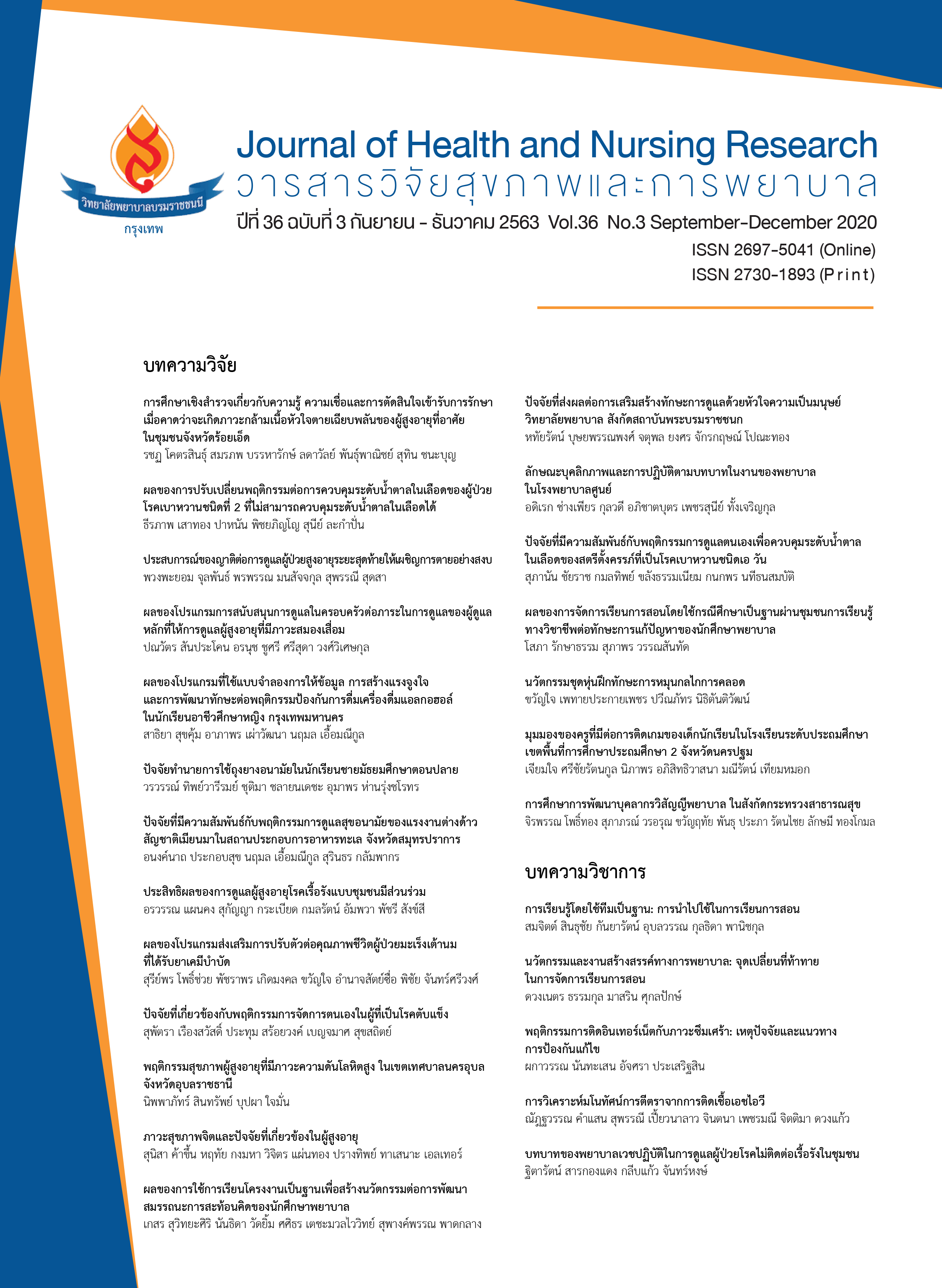ปัจจัยที่ส่งผลต่อการเสริมสร้างทักษะการดูแลด้วยหัวใจความเป็นมนุษย์ วิทยาลัยพยาบาล สังกัดสถาบันพระบรมราชชนก
คำสำคัญ:
การดูแลด้วยหัวใจความเป็นมนุษย์, การเสริมสร้างทักษะ, หัวใจความเป็นมนุษย์บทคัดย่อ
วิจัยเชิงคุณภาพเรื่องนี้มีวัตถุประสงค์เพื่อศึกษาปัจจัยที่ส่งผลต่อการเสริมสร้างทักษะการดูแลด้วยหัวใจความเป็นมนุษย์ วิทยาลัยพยาบาล สังกัดสถาบันพระบรมราชชนก กลุ่มเป้าหมายเลือกแบบเฉพาะเจาะจง(Purposive sampling) คือ ผู้ทรงคุณวุฒิที่เป็นผู้บริหาร อาจารย์ ผู้ใช้บัณฑิต ในปีการศึกษา 2562 วิทยาลัยพยาบาล ในสังกัดสถาบันพระบรมราชชนกที่มีผลงานวิชาการเกี่ยวกับการดูแลด้วยหัวใจความเป็นมนุษย์ ในแต่ละภาคของประเทศไทย จำนวน 5 ภาค ๆ ละ 1 วิทยาลัย โดยแต่ละวิทยาลัยมีผู้ทรงคุณวุฒิจำนวน 5 คน รวมผู้ทรงคุณวุฒิจำนวน 25 คน ซึ่งสมัครใจและต้องการร่วมแลกเปลี่ยนเรียนรู้ ดำเนินการวิจัยเชิงคุณภาพด้วยแบบสัมภาษณ์กึ่งโครงสร้าง (Semi structure question) ประกอบด้วยข้อคำถามจำนวน 11 ข้อ วิเคราะห์ข้อมูล โดยการวิเคราะห์เนื้อหา (Content analysis) ตรวจสอบผลการวิเคราะห์เนื้อหาด้วยวิธีวิเคราะห์แบบสามเส้า (Tri-angulation) โดยผู้บริหารระดับสูงหรือกลางของวิทยาลัย 1 คน อาจารย์ของวิทยาลัย 2 คนและ ผู้ใช้บัณฑิต 2 คนที่เข้าร่วมโครงการ
ผลการวิจัย พบว่าปัจจัยที่ส่งผลต่อการเสริมสร้างทักษะการดูแลด้วยหัวใจความเป็นมนุษย์ วิทยาลัยพยาบาล สังกัดสถาบันพระบรมราชชนกมี7ปัจจัยได้แก่หลักสูตร ผู้สอน ผู้เรียน วิธีการเรียนการสอน กิจกรรมพัฒนาผู้เรียน สิ่งสนับสนุนการเรียนการสอนและการวัดประเมินผล โดยปัจจัยที่มีความสำคัญที่สุดในการเสริมสร้างทักษะการดูแลด้วยหัวใจความเป็นมนุษย์ได้แก่ผู้สอนทั้งนี้เนื่องจากผู้สอนต้องประเมินผู้เรียนตลอดเวลาและเสริมสร้างความเข้าใจในส่วนที่ขาดได้ และปัจจัยที่มีความสำคัญน้อยที่สุดได้แก่สิ่งสนับสนุนการเรียนการสอน เนื่องจากเป็นเพียงสิ่งอำนวยความสะดวกในการเรียนการสอน
Downloads
เอกสารอ้างอิง
2. Jomsri P. Perception of nursing principle in Thailand. Journal of Thai Journal of Nursing Council 2010;25(1):27-37. (in Thai).
3. Sungjang C. Let's return the heart to the health system. Mohanamai Journal 2009;4(1):22-3. (in Thai).
4. Wongkongkathep S. Evaluation of learners and integrated teaching.[Research report]. Nonthaburi:Praboromarajchanok Institute, 2007:50-1. (in Thai).
5. Charoensuk S, Autthohi P, Pethkong J, Chulert P, Kaewmeungphang R, Kullapanit M, et al. Take lessons from skills development, learning process to change the paradigm to create innovation of health and public health development with the role of coach in reflecting with 3 basket techniques.Bangkok:Danex intercorperation Ltd., 2019. (in Thai).
6. Kumthana P, Inthana J, Wongyara N, Hakom N, Jumnean M. Perception of humanize health care behavior of students, teachers, users graduates and clients Rachaburi.[Research report]. Rachaburi: Boromarajonani Nursing College, Rachaburi, 2010 (in Thai).
7. Krekchaiwan D, Klungrith S. A study of the effect of integrated instructional management in health promotion and illness prevention subject. In:Knowledge Management The First Series, Methnawin S, Siriwethsoonthorn A ,editors. Praboromarajchanok Institute academic conference 2010 Life is Education, Education is Life ;2010 Aug 25-26; Monthein Riverside Hotel. Nonthaburi: Thahanphansook Printer; 2010.p.89-102. (in Thai).
8. Wongyai W. Graduate curriculum administration[Internet]. 2017[ cited 2019 Jan 14]. Available from: https://nawaporn.files.wordpress.com ›2009/01. (in Thai).
9. Wongkongkhathep S. Think and do, do and think 2. Nonthaburi: Department of Thai Traditional and Alternative Medicine; 2016; 23-33.(in Thai)
10. Thipsungnoen T. A causal model of caring behavior of nursing students in boromarajonani college of nursing of praboromarajchanok institute for health workforce development [doctoral’s thesis].Nonthaburi: Sukhothaithumathiraj University;2019:279. (in Thai).
11. Praboromarajchanok Institute. A guide to proceeding to achieve praboromarajchanok graduate identity. Nonthaburi: Praboromarajchanok Institute; 2011;11-15. (in Thai).
12. Chueatong S, Krirkgulthorn T. The development of service mind and humanized care for nursing student. Journal of Nursing and Education 2018;11(4):1-13. (in Thai).
13. Bunnakit H, Yana A. The Learning outcomes of students from the integrated nutrition subject. In: Knowledge Management The First Series, Methnawin S, Siriwethsoonthorn A,editors.Praboromarajchanok Institute academic conference 2010 Life is Education, Education is Life; 2010 Aug 25-26; Monthein Riverside Hotel. Nonthaburi: Thahanphansook Printer; 2010. 8-15.(in Thai).
14. Karen L. Mc Camant. Humanistic nursing, interpersonal relations theory, and the Empathy-Altruism Hypothesis. Nursing Science Quarterly 2006;19(4):334-8.
15. Judy E, Duchscher B. Bending a habit: critical social theory as a framework for humanistic nursing education. Nurse Education Today 2000;20:453–62.
ดาวน์โหลด
เผยแพร่แล้ว
รูปแบบการอ้างอิง
ฉบับ
ประเภทบทความ
สัญญาอนุญาต
บทความที่ได้รับการตีพิมพ์ เป็นลิขสิทธิ์ของวารสารวิจัยสุขภาพและการพยาบาล (วิทยาลัยพยาบาลบรมราชชนนี กรุงเทพ) ไม่สามารถนำไปตีพิมพ์ซ้ำในวารสารฉบับอื่น


















